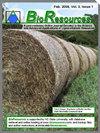Evaluating the anti-yeast, anti-diabetic, wound healing activities of Moringa oleifera extracted at different conditions of pressure via supercritical fluid extraction
IF 1.3
4区 农林科学
Q2 MATERIALS SCIENCE, PAPER & WOOD
引用次数: 0
Abstract
Plants represent a great source of medicines, and for their components to be discovered, extraction processes must be developed, especially methods based on green technology. Supercritical fluid extraction (SFE) was employed as a green method for Moringa oleifera extraction in the present investigation. The maximum yield of extraction was obtained at 25 MPa. Moreover, the extraction at 25 MPa induced the release of various phenols and flavonoids, as analyzed via high-performance liquid chromatography. The investigation revealed the concentrations of chlorogenic, gallic, rosmarinic, and coumaric acids to be 150.59, 89.90, 44.75, and 29.41 µg/mL, respectively at 25 MPa. However, their concentrations were 0.73, 1.53, 0.24, and 0.04 µg/mL, respectively at 15 MPa; vs. 4.73, 2.62, 1.06, and 0.50 at 35 MPa, respectively. Totals of saponin, flavonoid, phenolic, tannins, and alkaloid were recorded in maximum yield at 25 MPa. Moringa oleifera extracted at 35 MPa reflected highest inhibition zones of 27 ± 0.1, 30 ± 0.2, and 30 ± 0.1 mm against C. glabrata, C. tropicalis, and C. albicans, correspondingly. α-Amylase and α-glucosidase activities were greatly suppressed by the M. oleifera extract at 25 MPa with less IC50 (12.97 µg/mL and 6.0 µg/mL), than the IC50 (53.46 and 22.02 µg/mL) at 15 MPa, compared with acarbose IC50 (5.52 and 2.64 µg/mL), correspondingly.评估通过超临界流体萃取法在不同压力条件下提取的辣木的抗酵母菌、抗糖尿病和伤口愈合活性
植物是药物的重要来源,要想发现其成分,就必须开发萃取工艺,尤其是基于绿色技术的方法。本研究将超临界流体萃取(SFE)作为一种绿色方法用于辣木籽的萃取。在 25 兆帕时,萃取率最高。此外,经高效液相色谱分析,在 25 兆帕萃取过程中释放出了多种酚类和黄酮类化合物。调查显示,在 25 兆帕时,绿原酸、没食子酸、迷迭香酸和香豆酸的浓度分别为 150.59、89.90、44.75 和 29.41 微克/毫升。然而,在 15 兆帕时,它们的浓度分别为 0.73、1.53、0.24 和 0.04 微克/毫升;而在 35 兆帕时,它们的浓度分别为 4.73、2.62、1.06 和 0.50 微克/毫升。在 25 兆帕时,皂苷、黄酮、酚类、单宁和生物碱的总产量最高。在 35 兆帕条件下提取的辣木籽对 C. glabrata、C. tropicalis 和 C. albicans 的抑制区分别为 27 ± 0.1 毫米、30 ± 0.2 毫米和 30 ± 0.1 毫米。与阿卡波糖的 IC50(5.52 和 2.64 µg/mL)相比,油橄榄提取物在 25 兆帕时大大抑制了α-淀粉酶和α-葡萄糖苷酶的活性,IC50(12.97 µg/mL 和 6.0 µg/mL)低于 15 兆帕时的 IC50(53.46 和 22.02 µg/mL)。
本文章由计算机程序翻译,如有差异,请以英文原文为准。
求助全文
约1分钟内获得全文
求助全文
来源期刊

Bioresources
工程技术-材料科学:纸与木材
CiteScore
2.90
自引率
13.30%
发文量
397
审稿时长
2.3 months
期刊介绍:
The purpose of BioResources is to promote scientific discourse and to foster scientific developments related to sustainable manufacture involving lignocellulosic or woody biomass resources, including wood and agricultural residues. BioResources will focus on advances in science and technology. Emphasis will be placed on bioproducts, bioenergy, papermaking technology, wood products, new manufacturing materials, composite structures, and chemicals derived from lignocellulosic biomass.
 求助内容:
求助内容: 应助结果提醒方式:
应助结果提醒方式:


